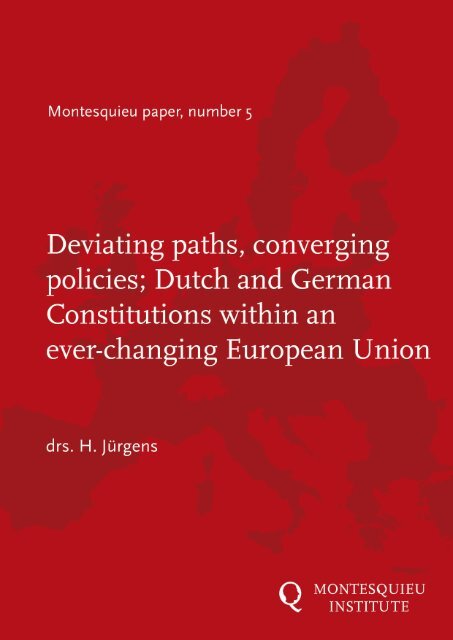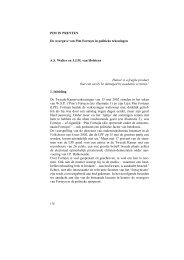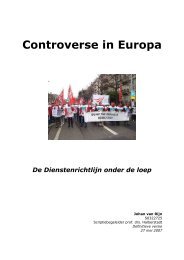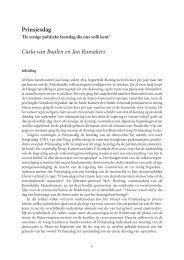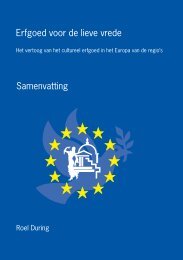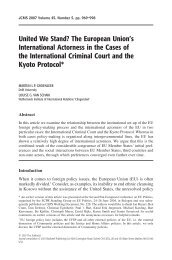Untitled - Montesquieu Instituut
Untitled - Montesquieu Instituut
Untitled - Montesquieu Instituut
You also want an ePaper? Increase the reach of your titles
YUMPU automatically turns print PDFs into web optimized ePapers that Google loves.
Deviating paths, converging policies; Dutch and German Constitutions within an everchanging<br />
European Union<br />
Hanco Jürgens, Amsterdam Institute for German Studies / <strong>Montesquieu</strong> Institute, The Hague<br />
In 2012, both German and Dutch politicians brought the ratification of the European Stability<br />
Mechanism (ESM) to court. The central question of the lawsuits was whether the<br />
establishment of a European permanent rescue fund was in keeping with national law. The<br />
lawsuits illustrate well how the various legal systems of EU member states respond to the<br />
European integration process, which is entering a new critical phase. In the Netherlands, the<br />
complainant, Mr. Geert Wilders, leader of the populist Party for Freedom, did stand a chance<br />
at all. Wilders critically commended on the democratic procedures of the ESM. The extensive<br />
power and immunity of its governors indeed hinders parliamentary control. However, his<br />
main argument was procedural: as the Dutch Rutte-Verhagen cabinet had resigned prior to the<br />
ratification of the treaty, the issue had become too important to discuss in Parliament before<br />
new elections take place. Mr. Wilders’ case was handled by a regular court in The Hague. The<br />
judge denied the claim. He referred to the separation of powers, laid down in the Dutch<br />
constitution, and asserted that he is not in the position to interfere in politics, including when<br />
there are serious shortcomings in the decision-making process. 1<br />
Unlike the Dutch case, the German lawsuit was considered by many opinion makers to<br />
be a potential threat to further European integration. 2 After the federal German parliaments,<br />
the Bundestag and Bundesrat, both had approved the ESM Treaty and the EU Fiscal Pact with<br />
a two-third majority, the German president Joachim Gauck decided to postpone the<br />
ratification of the treaty until the Federal Court had approved the constitutionality of the<br />
treaty. In Europe, alarm bells started to ring. The decision of Karlsruhe could have serious<br />
consequences, not only for EU policy, but also for the financial markets. Various politicians -<br />
representing the citizen movement ‘More Democracy’, the Bavarian Christian Democratic<br />
Party CSU, and the populist Left Party Die Linke - accompanied by 37,000 German citizens,<br />
petitioned the Federal Constitutional Court in Karlsruhe to prohibit the German ratification.<br />
The complainants brought in several arguments, of which a further loss of sovereignty and a<br />
1 Dutch Judiciary and the Supreme Court of the Netherlands, LJN: BW7242, Rechtbank<br />
‘s Gravenhage, 419556 / KG ZA 12-523, viewed at 27-09 2012,<br />
http://zoeken.rechtspraak.nl/detailpage.aspx?ljn=BW7242<br />
2 See for example: Paul Gallagher, Challenges to the ESM Treaty and the Fiscal Compact Treaty before the<br />
German Constitutional Court, Working Paper, 10, Institute of International and European Affairs, 2012.<br />
1
democracy deficit were the most important. According to the complainants, the German<br />
parliament would no longer be able to control the new facility sufficiently enough. Due to<br />
their duty of confidentiality, the governors - the secretaries of finance of the Eurozone<br />
member states - are not allowed to account for their decisions publicly, nor to inform the<br />
German Bundestag comprehensively. To prevent speculation of the markets, they are, when<br />
necessary, allowed to rise their lending capacity limitlessly. The complainants claim that this<br />
is a violation of the budgetary responsibility of the German Bundestag. Although the demands<br />
of the German complainants were refused, the judges stipulated two conditions to safeguard<br />
the rights of the German federal parliament. 3 Firstly, both German houses must be informed<br />
sufficiently about the ESM funding, despite the code of confidentiality. Secondly, the German<br />
contribution may not exceed the current maximum of 190 billion euro without the approval of<br />
the Bundestag. These conditions are considered to be moderate. Only one day after the<br />
judgment, president Gauck signed the ESM Treaty and Fiscal Pact into law. To effectuate<br />
final ratification, the German cabinet drafted an ‘interpretive declaration’ which secured the<br />
extra democratic checks sought by the Karlsruhe court. After this declaration was approved<br />
by all parties directly involved - the Bundestag, the constitutional court, and the Eurozone -<br />
Gauck finally signed the ratification record two weeks after the judgement of Karlsruhe had<br />
passed.<br />
In this paper, I will discuss the European integration process from the perspective of<br />
these two member states’ constitutional cultures in a transnational perspective, taking each<br />
others and the wider European perspective into account. So far, legal scholars have dominated<br />
the debate about the coming into being of a European legal order as well as the openness of<br />
national constitutions towards Europe. To understand the Dutch and German constitutional<br />
perspective on European integration, a transnational, historical approach could reveal and<br />
contextualise different national paths, differences of opinion among politicians as well as<br />
among legal scholars and the public. 4 Also, it shows how relevant national constitutional<br />
cultures are to the general debates about the present and future state of the EU, and about the<br />
place of national constitutions within the European legal order - a question which is more<br />
complex than often assumed. After the Treaty of Maastricht, and particularly after the<br />
Maastricht-judgement of the German Constitutional Court, the relationship between national<br />
constitutions and a European legal order was questioned. The European integration process<br />
3 Bundesverfassungs Gericht, 2 BvR 1390/12 vom 12.9.2012, Absatz-Nr. (1-319), viewed at 27-09 2013,<br />
http://www.bverfg.de/entscheidungen/rs20120912_2bvr139012.html<br />
4 See Bill Davies and Morten Rasmussen, ‘Towards a New History of European Law’, Contemporary European<br />
History, 21, 3 (2012), 305-318 (introduction to a special issue of this periodical).<br />
2
has become one of the biggest challenges to those national constitutions, which were drafted<br />
in a period when other challenges were at stake. In this paper, I will show how both<br />
constitutional path dependencies and the search for a European public brought about new<br />
views of the relationship between the EU and its member states. The deviating Dutch and<br />
German perspectives of this could explain the background and setting of many legal, political<br />
and social debates about the EU in both countries. Finally, I will explain why, despite all<br />
differences, the Dutch and German constitutional policy in general has been and still is<br />
converging.<br />
Two types of constitutions<br />
One could distinguishe two main types of constitutions in Europe, which each differ in the<br />
way constitutional rights are established. 5 There are constitutions with a long history which<br />
has changed incrementally. In these more or less ‘old-fashioned’ constitutions, the traces of<br />
political and social changes are incorporated in such a way that it is hardly possible to detect<br />
its original intend. The meaning of these constitutions is determined by their evolution. Since<br />
the political order has engendered the incremental changes within these constitutions, they are<br />
less formalistic and more political in nature. A second type is the result of a revolutionary<br />
change of government. These constitutions were usually written in reaction to earlier<br />
historical events and were created in the spirit of a ‘moving myth’, such as liberté, égalité,<br />
fraternité or nie wieder. They have often been designed to constitute a new political reality,<br />
not the other way around. They tend to have a strong legal character, safeguarded by a court<br />
of law. According to the Dutch constitutional law scholar Leonard Besselink, the original<br />
intention of these constitutions remains important for an overall understanding.<br />
The Dutch constitution is both a product of a revolutionary change - the instalment of<br />
a kingdom in 1814-1815 - and of a longer history. It was written in a completely different<br />
social setting and underpinned an entirely different political order. Since its adoption in 1814,<br />
the Dutch constitution has been amended 24 times. 6 It lacks a formalistic, detailed, and<br />
strongly legal character. It even leaves open many fundamental questions to ‘unwritten<br />
5 Leonard Besselink, ‘The Dutch Constitution, the European Constitution and the Referendum’, in: Anneli Albi<br />
and Jacques Ziller (ed.), The European Constitution and National Constitutions, Ratification and Beyond<br />
(Alphen aan de Rijn 2007), 113-123.<br />
6 Gret Haller, a.o., European Commission for Democracy through Law, Report on constitutional amendment,<br />
Study 469 / 2008, 6, viewed on 27-09 2012, http://www.venice.coe.int/docs/2010/CDL-AD(2010)001-e.pdf.<br />
3
constitutional law’, for example the formation of a new cabinet. Since there is no<br />
constitutional court in the Netherlands, the constitution plays a relatively modest role in<br />
policy-making. Experts in Dutch constitutional law generally agree that the constitution<br />
distinguishes itself by its utter lack of pretension. 7<br />
The German constitution is in many ways the opposite of the Dutch. It is designed to<br />
outline the German federal democracy and does not leave many questions open to<br />
interpretation. Above all, the rulings of the Constitutional Court on the basis of the<br />
Grundgesetz are legally binding. The Basic Law is written to prevent, through any legal<br />
means, a recurrence of a boundless centralisation of power and of brute misuse of<br />
constitutional rights. Since the Weimar Constitution was perverted by the Nazis through legal<br />
measures, and many lawyers appeared to be loyal to the National Socialist regime, the postwar<br />
Basic Law was supposed to become an important symbol of German democracy. 8 To<br />
confirm the German principles of democracy, the authors of the Basic Law introduced an<br />
‘eternity clause’, which can never be changed by parliament alone (as happened in 1933).<br />
Since the judges of the Constitutional Court are not afraid of bringing politicians to account,<br />
they personify the values of the constitution. They are of great importance in the German<br />
political decision-making process, since they exercise the right to examine all directives and<br />
regulations for compatibility with the constitution, and they rule over the relationship between<br />
the federation (Bund) and the states (Bundesländer). When the president of the Court,<br />
Andreas Voßkuhle, stated in an interview that ‘more Europe is barely allowed in the German<br />
basic law’, his warning was heard by many in Europe. 9<br />
These historical, social and institutional circumstances are of great importance to a<br />
better understanding of the current Dutch and German constitutional perspectives of European<br />
integration. There are four important differences to take into consideration. The Dutch and<br />
German constitutions differ sharply on the availability of judicial review, the way transfer of<br />
sovereignty is guaranteed (or not), the relationship between national and European law and,<br />
finally, the form of government. I will discuss the four differences which influence the<br />
7 Bruno de Witte, ‘Do not mention the Word, Sovereignty in Two Europhile Countries: Belgium and the<br />
Netherlands’, in: Neill Walker, (ed.), Sovereignty in Transition (Oxford 2003), 351-366, there 358, see also<br />
Barbara Oomen, ‘Constitutioneel bewustzijn in Nederland’, Recht en Werkelijkheid 2 (2009), 55-79, there 57.<br />
8 Tine Stein, ‘Vergangenheitsbewältigung im Medium der Verfassungspolitik? Die deutsche<br />
Verfassungsdiskussion nach 1989 zwischen Vergangenheit und Zukunft’, in: Helmut König, Michael<br />
Kohlstruck, Andreas Wöll (ed.), Vergangenheitsbewältigung am Ende des 20. Jahrhunderts (Opladen 1998),<br />
136-166.<br />
9 Melanie Amann and Inge Kloepfer, ‘Im Gespräch: Andreas Voßkuhle, „Mehr Europa lässt das Grundgesetz<br />
kaum zu“’, Frankfurter Allgemeine Zeitung, 25-9, 2011.<br />
4
elations between these two member states and the EU so strongly. Finally, I will argue that,<br />
in the end, they are no obstacle for converging policies.<br />
Judicial Review<br />
There are two main types of constitutional review: Firstly, there is a court review, present in<br />
all federal states, which rules over the relations between the federation and its constituent<br />
countries. The question reviewed here is how authority is distributed by the constitution to<br />
various parts of the state; to the national and the component unit levels. 10 A second type of<br />
review is not about who is authorised to do what but about what limits may be placed on<br />
doing certain things. Here, the area of fundamental and civil rights, of bills, charters and<br />
declarations is at stake. It is the area where citizens file a constitutional complaint to protect<br />
their individual rights. While in Germany these two types of review are embodied in the two<br />
senates of the Constitutional Court of Karlsruhe, non of these exist in the Netherlands. Since<br />
the Dutch Constitution explicitly forbids the judicial review of the constitutionality of Acts of<br />
Parliament and of treaties, Mr. Wilders did not stand a chance of winning his case. In Dutch<br />
political culture, the separation of powers, as it is laid down in the constitution, is strictly<br />
observed. Professional judges, who are appointed by their peers are not supposed to interfere<br />
in the political process of decision making. Elected members of parliament are, together with<br />
the government, expected to exercise their legislative power independently. The situation in<br />
the Netherlands remains quite exceptional, since the power of the judiciary to review<br />
legislation for compatibility with international treaties has been recognised in the constitution<br />
since 1953. 11 This means that a Dutch citizen can effectively file a complaint based on<br />
international law, but not on its own constitution.<br />
However, the long debate in the Netherlands about the necessity of constitutional<br />
review has led to the 2002 resolution of Ms. Femke Halsema, who was the Green Party<br />
leader, to allow judges to test formal statutes against the fundamental rights laid down in the<br />
Constitution. This form of judicial review will only be allowed with regard to those<br />
constitutional provisions which contain the so-called ‘subjective rights’, such as freedom of<br />
10 David Robertson, The Judge as Political Theorist, Contemporary Constitutional Review (Princeton 2010), 9-<br />
10.<br />
11 Maurice Adams and Gerhard van der Schyff, ‘Constitutional Review by the Judiciary in the Netherlands A<br />
Matter of Politics, Democracy or Compensating Strategy?’, Zeitschrift für ausländisches öffentliches Recht und<br />
Völkerrecht, 66 (2006), 399-413, spec. 402.<br />
5
speech, freedom of assembly or the right to be protected against discrimination. Halsema’s<br />
proposal is still under review by both parliaments, but it remains to be seen whether it will<br />
finally pass the second reading with a two-third majority in both houses, which is necessary to<br />
amend the constitution. If this resolution is adopted, which is hardly expected, this form of<br />
constitutional review will not influence the political relations between the Netherlands and the<br />
EU in the same way that the German review does, particularly since the fundamental rights<br />
are already guaranteed in international law, often better formulated than in the Dutch<br />
constitution, which is not in all aspects up to date. 12<br />
In Germany, the constitutional court became internationally well known for reviewing<br />
important European treaties, such as the Maastricht Treaty and the Treaty of Lisbon. Even<br />
outside Germany, politicians fear the political interference of the German judges in the<br />
European integration process. In Germany, the interference of judges in the political decisionmaking<br />
process is usually not considered a problem. Of course, in the European policy arena,<br />
the German time-consuming decision making process is not always appreciated.<br />
Within Germany, the Constitutional Court is usually considered a reliable safeguard of<br />
democracy. In recent decades, it has built this reputation also because of its reviews of<br />
European treaties. With its famous Solange I and Solange II judgments, respectively in 1974<br />
and 1986, the court postulated a conditional acceptance of EU law, ‘as long’ as it guarantees<br />
the fundamental rights laid down in the German basic law. 13 With the Courts’ judgement of<br />
the Treaty of Maastricht, it became clear that this was no hollow phrase. The court defined a<br />
limit to the EU’s power in terms of its impact on national democratic sovereignty. However,<br />
the Court confirmed its ‘cooperative relation’ with the European Court of Justice, it also<br />
confirmed to approve EU law only when it is compatible with the Grundgesetz, and finally<br />
that the Constitutional Court itself judges this compatibility. The 1993 Maastricht Judgement<br />
agonised European federalists, who took the supremacy of European law for granted. Even<br />
fourteen years later, the Spanish constitutional law scholar Julio Baquero Cruz described the<br />
legacy of the Maastricht Judgement as risky, as distorting our view of the Union, leading to a<br />
stalemate in the politics of law. He considers a ‘power game’ among judicial institutions as a<br />
potential danger to the European rule of law, the rights of citizens, supranational politics and<br />
12 See the debate between Gerhard van der Schyff, ‘Waarom het wetsvoorstel Halsema tekort schiet: Mythes<br />
rondom het verdragsargument’, Nederlands Juristenblad 2009, 2408-2414, and: Jit Peters and Geerten<br />
Boogaard, ‘De mythes van Van der Schyff over het initiatiefwetsvoorstel-Halsema’, NJB 2009, 2628-2630.<br />
13 In English, see: University of Texas, Institute for Transnational Law, Foreign Law Translations, viewed at 27-<br />
09 2012, http://www.utexas.edu/law/academics/centers/transnational/work_new/german/table.php?id=125.<br />
6
the progressive democratization of the Union. 14 After the Lisbon Treaty, in its 2009 Lisbon-<br />
Judgement, the Court met to the objections of its critics by underlining the ‘Europefriendliness’<br />
of the German constitution. However, it further elaborated on the ‘democracy<br />
deficits’ of the European parliament. As long as the control powers and democratic legitimacy<br />
of the European Parliament are not sufficiently guaranteed, and the court thinks they are not,<br />
the democratic rights of the German parliaments must be protected. Following this judgment,<br />
the German chancellor must inform the Bundestag before and after every EU summit about<br />
his or her policy. Also, not the German cabinet but both chambers decide on any possible<br />
transfer of sovereignty towards the EU.<br />
Transfer of sovereignty and the supremacy of international law<br />
Sovereignty is a politicised concept. ‘Transfer of sovereignty’ has become a sensitive issue,<br />
since it weakens the idea of a ‘Europe of the fatherlands’ and confirms the idea of an<br />
irreversible integration process, summed up as an ‘ever closer Union’. The EU is often<br />
considered a test case for the transformation of state and popular sovereignty into a postsovereign<br />
society, regulated on the basis of rights. 15 Seen from the perspective of the member<br />
states, in casu Germany and the Netherlands, one again encounters opposing approaches.<br />
While sovereignty is a key issue in the German constitution, and particularly in its<br />
interpretation by the Karlsruhe Court, the concept is absent in the Dutch constitution. While in<br />
Germany sovereignty has been a contested concept, in the Netherlands sovereignty seems to<br />
have been self-evident to such a degree that it was not considered necessary to turn it into a<br />
constitutional issue.<br />
After the Second World War, Germany had to regain its sovereignty, both externally,<br />
the power to act in the world arena, as well as internally, the power of self determination. 16<br />
Although the German Federal Republic in practice regained its external sovereignty in 1955,<br />
full sovereignty was only reached after the Two Plus Four Agreement, signed by the Allied<br />
Forces and representatives of both Germanies in 1990. Yet, internal sovereignty was<br />
contested even more strongly. The post-war division into two Germanies had made the<br />
14 See: Julio Bacquero Cruz, The Legacy of the Maastricht-Urteil and the Pluralist Movement , EUI Working<br />
Papers, RSCAS 2007/13, 23.<br />
15 R. Bellamy, ‘Sovereignty, post-sovereignty and pre-sovereignty: three models of the state, democracy and<br />
rights within the EU’, in: Neill Walker, (ed.), Sovereignty in Transition (Oxford 2003), 167-190.<br />
16 Miriam Aziz, ‘Sovereignty Über Alles: (Re)Configuring the German Legal Order’, in: ibidem, 279-304.<br />
7
question topical, since it remained an issue which belonged to ‘the German people’. Until the<br />
1999 reforms of the German nationality law, German citizenship was not determined by place<br />
of birth but by having at least one German parent. This question, ‘who belongs to the German<br />
people?’, has become even more urgent considering the way sovereignty is explained in the<br />
basic law: “All state authority is derived by the people” (Act 20 GG). The German democracy<br />
is a popular sovereignty, which means that the legitimacy of the state and its state organs are<br />
sustained by the will and consent of the people, who are the source of all political power. The<br />
state authority is exercised by the people through elections and through legislative, executive<br />
and judicial bodies, such as the Bundestag, the Cabinet, and the Constitutional Court. For this<br />
reason, the concern about the loss of sovereignty through the loss of budgetary rights by the<br />
German parliaments became a key issue in the rulings of the Constitutional Court on EUtreaties.<br />
The court just protects the democratic rights of the German people. If these rights are<br />
transferred to EU-institutions in an orderly way, meaning by general consent of the German<br />
Bundestag and in keeping with the German constitution, the Court does not have any<br />
objections against further integration. If not, then Germany has a problem, and the EU as well.<br />
Interestingly, the concept of sovereignty has been of great importance in German<br />
constitutional thinking, not because of a possible transfer, but because of the legal protection<br />
of the democratic values of the people which were at stake after the Second World War. As is<br />
often the case, the original concept serves new purposes.<br />
As earlier mentioned, the concept of sovereignty has not been a key issue in Dutch<br />
politics, as shown by its absence in the constitution. 17 Only in the original 1814 version,<br />
which was valid for just one year, was sovereignty offered to the king and his heirs. But the<br />
paragraph was changed already in 1815, when not sovereignty but the crown was offered to<br />
the king. 18 In the 1814 version is already stated that the States General represent the entire<br />
people of the Netherlands, but this form representation mainly served as a legitimation of the<br />
unity and general public spirit within the new kingdom. 19 While the Dutch semi-absolutist<br />
monarchy gradually developed into a liberal democratic order, the constitution itself did not<br />
change as drastically into a people or a parliamentary sovereignty (although in fact it is close<br />
to the last variant). In the Nineteenth and a large part of the Twentieth Century, the concept of<br />
national sovereignty did not match with the Calvinist principle of ‘sovereignty in one’s own<br />
17 Bruno de Witte, ‘Do not mention the Word’, in: Neill Walker, (ed.), Sovereignty in Transition (Oxford 2003),<br />
351-366<br />
18 Parlementair Documentatie Centrum, ‘De Nederlandse Grondwet’, viewed at 27-09 2012,<br />
http://www.denederlandsegrondwet.nl/9353000/1/j9vvihlf299q0sr/vi6dcwst7dtw<br />
19 Ibidem, ‘Artikel 52: Staten-Generaal vertegenwoordigen het geheele Nederlandsche volk; Toelichting<br />
Staatscourant’, http://www.denederlandsegrondwet.nl/9353000/1/j9vvihlf299q0sr/vi6dhrlc6mzx<br />
8
sphere’. The constitutional reforms of 1953/1956 followed an older international law tradition<br />
by prioritizing adopted international law treaties over national law, even when they are<br />
conflicting. The reform was necessary to accept the 1957 Treaty of Rome and it includes<br />
treaties and decisions of international organizations like the EU. This non restrictive approach<br />
to international treaties is rather unique. Still, there is a mechanism to control the<br />
constitutionality of new treaties, which can be done only by Parliament and only in the short<br />
period before the treaty is adopted. 20 If Parliament decides that a new treaty contains<br />
provisions that deviate from the constitution, the treaty may only be approved by a two third<br />
majority of both houses (which is a shortened procedure to amend the constitution). After an<br />
international treaty is approved and made public, no constitutional review is allowed<br />
anymore.<br />
This brings me to an important third difference between the two EU member states. In<br />
the Dutch legal order, international law is more highly ranked than the constitution itself. The<br />
Dutch system could be qualified as moderate monist, which means that the internal and<br />
international legal system form a unity. Both national and international law, accepted by the<br />
state, determine whether actions are legal or illegal. 21 In the German dualist system, national<br />
and international law are two distinct spheres. International law does only exist as law after it<br />
has been translated to national law. Like the Netherlands, Germany is bound by international<br />
law, but in Germany international law has to be translated first to become valid as German<br />
law. On the one hand, one could designate this as just paperwork, on the other hand it might<br />
stand for more than that.<br />
The idea of Dutch monism versus German dualism fits to the Dutch and German<br />
forms of government; a unitary state versus a federation. The debate about constitutional<br />
pluralism within the European legal realm, initiated after the Maastricht-Urteil, relates to the<br />
idea of ‘multilevel constitutionalism’, as put forward by the prominent German constitutional<br />
scholar Ingolf Pernice. 22 This concept is in keeping with the German legal and political order<br />
and with Germany’s relations with the EU. With its federal structure, legal culture,<br />
constitutional court, clear demarcation of competences between federation and states, checks<br />
and balances and control mechanisms, German congruency with the EU is significantly higher<br />
20 De Witte, Sovereignty, 362, see also Karin van Leeuwen, ‘On democratic concerns and legal traditions. The<br />
Dutch 1953 and 1956 constitutional reforms ‘towards’ Europe’, Contemporary European History, 21 (2012)<br />
357-374<br />
21 Pieter Kooijmans, Internationaal publiekrecht in vogelvlucht (Groningen 1994), 82-84.<br />
22 Among many others: Ingolf Pernice, The Treaty of Lisbon: Multilevel Constitutionalism in Action, WHI Paper,<br />
02/09 (Berlin 2009), see: Wouter Hulstijn and Jan Willem van Rossum, ‘Het Lissabon-Urteil: pluralisme op<br />
Duitse voorwaarden’, in: J.M.J. van Rijn van Alkemade en J. Uzman (ed.), Soevereiniteit of pluralisme?<br />
Nederland en Europa na het Lissabon-Urteil, Preadviezen Jonge Staatsrechtdag 2010 (Nijmegen 2011), 21-47.<br />
9
than Dutch congruency. 23 Already in the 1990s it became clear to the Dutch public that it<br />
would be difficult to transpose the Dutch consensual ‘poldermodel’ to the European level. 24<br />
For the Dutch, this has led to a lack of a recognizable European political culture, of forms and<br />
structures within the EU which are familiar to their own. In 1996, the Dutch influential<br />
commentator Paul Scheffer stated that the picture of a federal Europe has been a naive<br />
projection of German federalism on the EU as a whole, and that classical thinking about<br />
integration fails to appreciate the tenacity of political and cultural loyalties elsewhere. 25<br />
A lack of congruence?<br />
To sum up, the idea of a European constitution seems to have been embedded in German<br />
political and intellectual culture, and felt unfamiliar to many Dutchmen. 26 The former German<br />
Foreign Minister Joschka Fischer as well as the philosopher Jürgen Habermas could be<br />
considered the fathers of the idea of a European constitution. In his legendary 2000 Humboldt<br />
address, Joschka Fischer proposed to strive for an ultimate ‘finality’ of European integration<br />
by drafting a constitutional treaty, and establishing a new federation based on the principle of<br />
subsidiarity. 27 The idea of a European constitution met with broad support among German<br />
politicians, including those at the state level, who considered it a chance to secure the position<br />
of the Länder in Berlin as well as in Brussels. 28<br />
Of the German intellectuals, Jürgen Habermas was the most prominent proponent of<br />
the idea. He transposed the idea of active citizenship in a post-national state under a<br />
democratic constitution towards the EU. European constitution building would function as a<br />
23 Simon Bulmer and Charlie Jeffery, ‘Does Congruence matter? Germany and Britain in the European Union’,<br />
in: ibidem, and Stephen Padgett, Rethinking Germany and Europe, Democracy and Diplomacy in a Semi-<br />
Sovereign State (New York 2010), 113-138.<br />
24 Hanco Jürgens, Identity loss; identity regained? Recent transitions of the Dutch and German social<br />
welfare states in a European perspective, <strong>Montesquieu</strong> Paper, 3 (2012), ibidem, ‘Soziale Marktwirtschaft,<br />
Modell Deutschland und Poldermodell, wirtschaftspolitische Leitbilder als Merkmale nationaler Identität und<br />
Europäisierung’, Eurostudia , 7:1-2 (2011), 105-118<br />
25 Paul Scheffer, ‘Land zonder spiegel, Over de politieke cultuur in Nederland’, in Koen Koch (ed.), Het nut van<br />
Nederland, opstellen over soevereiniteit en identiteit (Amsterdam 1996), 14, quoted by Jieskje Hollander, ‘The<br />
Dutch Intellectual Debate on European Integration (1948-present)’, Journal of European Integration History, 2<br />
(2011), 197-218, there 213.<br />
26 See also Jieskje Hollander, ibidem, 197-218, and Jan-Werner Müller, ‘In the Shadow of Statism, Peculiarities<br />
of the German Debates on European Integration’, in: Justine Lacroix and Kalypso Nicolaïdis (ed.), European<br />
Stories, Intellectual Debates on Europe in National Contexts (Oxford 2010), 87-104.<br />
27 Joschka Fischer, ‘Vom Staatenverbund zur Föderation – Gedanken über die Finalität der europäischen<br />
Integration’, Humboldt-Rede, 12. Mai 2000, viewed at 27-09 2013, http://www.europa.clioonline.de/site/lang__de-DE/ItemID__17/mid__11373/40208215/default.aspx<br />
28 Charlie Jeffery, A Regional Rescue of the Nation State, EUSA Tenth Biennial International Conference,<br />
Montreal 2007, viewed at 27-09 2012, http://aei.pitt.edu/7918/1/jeffery-c-09j.pdf.<br />
10
focal point of European identity and transnational solidarity. Habermas supported Fischer’s<br />
address with various publications on the question ‘why Europe needs a constitution’. 29 As a<br />
philosopher in postwar Germany, he was and still is deeply involved in debates about the<br />
place of law in modern societies. Constitutional law is an important discipline in Germany,<br />
with its own libraries, periodicals and scholarly traditions. Thanks to the successive German<br />
judgements of the Constitutional Court, professors of constitutional law regularly publish in<br />
German newspapers.<br />
In 2005, Dutch intellectuals were hardly aware of these debates. The outcome of the<br />
2005 Dutch referendum on the Treaty establishing a Constitution came as a big surprise to<br />
many. Yet, seen from the perspective of the Dutch constitutional culture it might not have<br />
been so shocking. A formalistic, detailed, comprehensive basic law is not only unknown, but<br />
also considered unnecessary; the Dutch democracy functions rather well without it.<br />
In a 2005 news broadcast Buitenhof, in which the German Foreign Minister Joschka<br />
Fischer was interviewed on the near referendum, the Dutch philosopher Herman Philipse<br />
called the voting a farce and a populist deception of the public. Philipse advised his audience<br />
not to vote since one needs days to read the necessary texts to make up one’s mind. He also<br />
condemned Dutch politicians avoiding further debate by not discussing the Constitution in<br />
parliament on forehand. To underline his statement, Philipse tore up his referendum ballot<br />
publicly. 30 He rightfully complained about the absence of a serious debate in the Netherlands<br />
about the issue. The referendum in both France and the Netherlands finally made clear that<br />
the EU depended on public support. The search for the European public became a topical<br />
issue in all capitals of Europe. To encounter this problem, the deviating political cultures of<br />
the various member states should be bridged in Brussels in such a way that European citizens<br />
could identify themselves both with national as well as with European politics.<br />
In Germany too, the public is skeptical about further integration. But the German<br />
political as well as the intellectual elite seems to have a more positive attitude towards the EU<br />
than the Dutch. They recognise more of their national path dependencies in EU policy than<br />
the Dutch do.<br />
29 Among others: Jürgen Habermas, ‘Why Europe needs a Constitution’, New Left Review 11, September-<br />
October 2001, 5-26.<br />
30 His second advice was, if one really wants to vote, from a sense of duty, to vote yes, since experts asserted the<br />
Constitution to be better than the existing treaties all together. According to the philosopher, one has to rely on<br />
experts, if one can not rely on one’s own judgment Herman Philipse, VPRO, Buitenhof, 22-5 2005, viewed at 27-<br />
09 2012, http://www.vpro.nl/programma/buitenhof/afleveringen/22038356/.<br />
11
Converging policies<br />
Considering the deviating paths described above, the differences between the Dutch and<br />
German constitutional relationships with the EU are in practice smaller than one might<br />
expect. One of the reasons is that the professional communities of lawyers made it their aim to<br />
effectuate article 4.3 of the Treaty of the European Union, to cooperate sincerely, and to assist<br />
each other with full mutual respect in carrying out tasks which flow from the Treaties. In both<br />
countries, the judicial Europeanisation has advanced tacitly. 31 It has been a complex process,<br />
often initiated by professional lawyers, who were aware of the necessity to accommodate<br />
national to European law, and vice versa. In reaction to the judicial activism of the European<br />
Court of Justice, national lawyers adapted their legal systems by actively monitoring and<br />
implementing EU law. Particularly when a judgment of the European Court of Justice gave<br />
rise to misunderstandings, a judicial ‘ping pong’ match takes place between national lawyers<br />
and the ECJ. 32 The judges’ contribution to judicial Europeanisation, often supplied by case<br />
law, has been complex to such an extend that it is usually only observed by experts.<br />
Another reason for putting the deviating paths into perspective is that member states<br />
politicians have a double role when they are active in the European arena; on the one hand<br />
they defend the interests of their home country, on the other hand they seek European<br />
solutions to find a way out in times of crisis. This double role makes them, willingly or not,<br />
the perfect representatives of both national as well as European interests. 33 Particularly in<br />
times of crisis, they tend to find solutions in converging policies, as is shown by the 2012 plan<br />
for a ‘genuine economic and monetary union’ of Herman van Rompuy. Since these plans are<br />
discussed exhaustively in Brussels as well as in the capitals of the member states, conflicts<br />
between national constitutions and European treaties are usually avoided beforehand.<br />
However, the most important reason is that the position of the Karlsruhe<br />
Constitutional Court is not as rigid as it seems to be. In its judgments, the Court has indeed<br />
demonstrated its Europe-friendliness and its cooperative attitude. Until now, the Court has not<br />
interfered in European affairs actively. Instead, it has been focusing on the German decisionmaking<br />
process, for example by defending the rights of the German parliament to be informed<br />
31 Anna Katharina Mangold, Gemeinschaftsrecht und deutsches Recht, Die Europäisierung der deutschen<br />
Rechtsordnung in historisch-empirischer Sicht (Tübingen 2011), 487-500, S. Prechal, R.H. van Ooik, J.H. Jans<br />
and K.J.M. Mortelmans, ‘Europeanisation’ of the law, consequences for the Dutch judiciary (Den Haag 2005).<br />
32 W.T. Eijsbouts a.o., Europees Recht – Algemeen Deel, Sinds het verdrag van Lissabon (Groningen 2010), 22,<br />
366-383, Damian Chalmers, Gareth Davies,and GiorgioMonti, European Union Law, Cases and Materials<br />
(Cambridge 2010), 168-177.<br />
33 See Luuk van Middelaar, De passage naar Europa, geschiedenis van een begin (Groningen 2009), 39-46.<br />
12
about the German position in the European Council and to decide on the transfer of<br />
sovereignty themselves. Through its judgments, the Court has become an important actor in<br />
the field of German as well as European politics. It set itself up as the safeguard of the rights<br />
of parliament within an ever-changing Union. With the increase of power of the European<br />
Council, this is no luxury but a necessary line defense.<br />
After comparing the German and Dutch constitutional perspectives on European<br />
integration, one may ask whether the debate about the Dutch democracy within the EU needs<br />
a new impetus. 34 The Netherlands does not dispose of a powerful institution which is able to<br />
protect the democratic rights of the parliament, besides the parliament itself. A critical focus<br />
on the democratic power and legitimacy of the European Parliament alone would certainly not<br />
be sufficient. The Karlsruhe Constitutional Court is right in claiming that ideas to solve a EU<br />
democracy deficit should not only focus on the EU level, but revalue democratic traditions at<br />
home as well. European integration has brought a decrease of competencies of national<br />
parliaments. Since many important decisions are made in Brussels by the Council of<br />
Ministers, and since the minutes of the council are confidential, the national parliaments are<br />
often dependent on responsible ministers to be informed. The German parliament has better<br />
access to confidential EU policy documents than the Dutch have. While the German<br />
Bundestag and Bundesrat have access to the public, limited, and restricted EU documents, as<br />
well as to the documents of the Committee of Permanent Representatives, the Council<br />
Working Group and Briefings, the Dutch MPs have only gained access to the public<br />
documents for parliamentary scrutiny. 35 Political control of EU decision making in the<br />
Netherlands is not only weakened by the lack of information provided by the Dutch<br />
government, but also by a lack of enthusiasm for the subject, as shown by parliamentarians.<br />
While in the Netherlands EU-affairs are even in times of crisis often left to a small group of<br />
specialised MPs, in Germany, the EU is of interest to all representatives, who, for example in<br />
case of the ESM Treaty, all attend the parliamentary debates.<br />
34 Ton Nijhuis, ‘Ontzet ziet Duitsland het Eurobeleid aan’, de Volkskrant, 17 september 2012, Erhard<br />
Blankenburg, ‘“Warum brauchen wir kein Verfassungsgericht?” Die niederländische Diskusion im Licht der<br />
deutschen Erfahrung’, in: Anita Böcker a.o., Migratierecht en rechtssociologie, gebundeld in Kees‘ studies<br />
(Nijmegen 2008), 303-310.<br />
35 Thanks to Sven Bergmann: Conference of Parliamentary Committees for Union Affairs of Parliaments of the<br />
European Union, Seventeenth Bi-annual Report: Developments in European Union Procedures and Practices<br />
Relevant to Parliamentary Scrutiny (Copenhagen 2012), 10, see also: Tineke Strik, ‘Nationale parlementen, de<br />
hoop van de Europese Unie?’, in: Anita Böcker a.o., Migratierecht en rechtssociologie, gebundeld in Kees‘<br />
studies (Nijmegen 2008), 365-376, and Leonard Besselink and Brecht van Maurik, ‘The Parliamentary<br />
Legitimacy of the European Union, The Role of the States General within the European Union’, Utrecht Law<br />
Review, 8, 1, January 2012, 28-50.<br />
13
Literature<br />
Adams, Maurice, and Schyff, Gerhard van der, ‘Constitutional Review by the Judiciary in the<br />
Netherlands A Matter of Politics, Democracy or Compensating Strategy?’, Zeitschrift für<br />
ausländisches öffentliches Recht und Völkerrecht, 66 (2006), 399-413, spec. 402.<br />
Amann, Melanie and Kloepfer, Inge, ‘Im Gespräch: Andreas Voßkuhle, „Mehr Europa lässt<br />
das Grundgesetz kaum zu“’, Frankfurter Allgemeine Zeitung, 25-9, 2011.<br />
Aziz, Miriam, ‘Sovereignty Über Alles: (Re)Configuring the German Legal Order’, in:<br />
ibidem, 279-304.<br />
Bacquero Cruz, Julio, The Legacy of the Maastricht-Urteil and the Pluralist Movement , EUI<br />
Working Papers, RSCAS 2007/13, 23.<br />
Bellamy, R., ‘Sovereignty, post-sovereignty and pre-sovereignty: three models of the state,<br />
democracy and rights within the EU’, in: Neill Walker, (ed.), Sovereignty in Transition<br />
(Oxford 2003), 167-190.<br />
Besselink, Leonard, ‘The Dutch Constitution, the European Constitution and the<br />
Referendum’, in: Anneli Albi and Jacques Ziller (ed.), The European Constitution and<br />
National Constitutions, Ratification and Beyond (Alphen aan de Rijn 2007), 113-123.<br />
ibidem, and Maurik, Brecht van, ‘The Parliamentary Legitimacy of the European Union, The<br />
Role of the States General within the European Union’, Utrecht Law Review, 8, 1, January<br />
2012, 28-50.<br />
Blankenburg, Erhard, ‘“Warum brauchen wir kein Verfassungsgericht?” Die niederländische<br />
Diskusion im Licht der deutschen Erfahrung’, in: Anita Böcker a.o., Migratierecht en<br />
rechtssociologie, gebundeld in Kees‘ studies (Nijmegen 2008), 303-310.<br />
Bulmer, Simon and Jeffery, Charlie, ‘Does Congruence matter? Germany and Britain in the<br />
European Union’, in: ibidem, and Stephen Padgett, Rethinking Germany and Europe,<br />
Democracy and Diplomacy in a Semi-Sovereign State (New York 2010), 113-138.<br />
Chalmers, Damien, Davies, Gareth, and Monti, Georgio, European Union Law, Cases and<br />
Materials (Cambridge 2010).<br />
Conference of Parliamentary Committees for Union Affairs of Parliaments of the European<br />
Union, Seventeenth Bi-annual Report: Developments in European Union Procedures and<br />
Practices Relevant to Parliamentary Scrutiny (Copenhagen 2012).<br />
Davies, Bill and Rasmussen, Morten, ‘Towards a New History of European Law’,<br />
Contemporary European History, 21, 3 (2012), 305-318.<br />
Eijsbouts W.T., a.o., Europees Recht – Algemeen Deel, Sinds het Verdrag van Lissabon<br />
(Groningen 2010)<br />
14
Fischer, Joschka, ‘Vom Staatenverbund zur Föderation – Gedanken über die Finalität der<br />
europäischen Integration’, Humboldt-Rede, 12. Mai 2000, http://www.europa.clioonline.de/site/lang__de-DE/ItemID__17/mid__11373/40208215/default.aspx<br />
Gallagher, Paul, Challenges to the ESM Treaty and the Fiscal Compact Treaty before the<br />
German Constitutional Court, Working Paper, 10, Institute of International and European<br />
Affairs, 2012.<br />
Habermas, Jürgen, ‘Why Europe needs a Constitution’, New Left Review 11, September-<br />
October 2001, 5-26.<br />
Haller, Gret, a.o., European Commission for Democracy through Law, Report on<br />
constitutional amendment, Study 469 / 2008, 6, http://www.venice.coe.int/docs/2010/CDL-<br />
AD(2010)001-e.pdf.<br />
Hollander, Jieskje, ‘The Dutch Intellectual Debate on European Integration (1948-present)’,<br />
Journal of European Integration History, 2 (2011), 197-218.<br />
Hulstijn, Wouter, and Rossum, Jan Willem van, ‘Het Lissabon-Urteil: pluralisme op Duitse<br />
voorwaarden’, in: J.M.J. van Rijn van Alkemade en J. Uzman (ed.), Soevereiniteit of<br />
pluralisme? Nederland en Europa na het Lissabon-Urteil, Preadviezen Jonge Staatsrechtdag<br />
2010 (Nijmegen 2011), 21-47.<br />
Jeffery, Charlie, A Regional Rescue of the Nation State, EUSA Tenth Biennial International<br />
Conference, Montreal 2007, viewed at 27-09 2012, http://aei.pitt.edu/7918/1/jeffery-c-09j.pdf.<br />
Jürgens, Hanco, Identity loss; identity regained? Recent Transitions of the Dutch and German<br />
Social Welfare States in a European Perspective, <strong>Montesquieu</strong> Paper, 3 (2012)<br />
ibidem, ‘Soziale Marktwirtschaft, Modell Deutschland und Poldermodell,<br />
wirtschaftspolitische Leitbilder als Merkmale nationaler Identität und Europäisierung’,<br />
Eurostudia , 7:1-2 (2011), 105-118<br />
Kooijmans, Pieter, Internationaal publiekrecht in vogelvlucht (Groningen 1994), 82-84.<br />
Leeuwen, Karin van, ‘On democratic concerns and legal traditions. The Dutch 1953 and 1956<br />
constitutional reforms ‘towards’ Europe’, Contemporary European History, 21 (2012) 357-<br />
374<br />
Mangold, Anna Katharina, Gemeinschaftsrecht und deutsches Recht, Die Europäisierung der<br />
deutschen Rechtsordnung in historisch-empirischer Sicht (Tübingen 2011)<br />
Middelaar, Luuk van, De passage naar Europa, geschiedenis van een begin (Groningen<br />
2009).<br />
Müller, Jan-Werner, ‘In the Shadow of Statism, Peculiarities of the German Debates on<br />
European Integration’, in: Justine Lacroix and Kalypso Nicolaïdis (ed.), European Stories,<br />
Intellectual Debates on Europe in National Contexts (Oxford 2010), 87-104.<br />
Nijhuis, Ton, ‘Ontzet ziet Duitsland het Eurobeleid aan’, de Volkskrant, 17 september 2012.<br />
15
Oomen, Barbara, ‘Constitutioneel bewustzijn in Nederland’, Recht en Werkelijkheid 2 (2009),<br />
55-79.<br />
Pernice, Ingolf, The Treaty of Lisbon: Multilevel Constitutionalism in Action, WHI Paper,<br />
02/09 (Berlin 2009).<br />
Peters, Jit, and Boogaard, Geerten, ‘De mythes van Van der Schyff over het<br />
initiatiefwetsvoorstel-Halsema’, Nederlands Juristenblad, 2009, 2628-2630.<br />
Prechal, S., Ooik, R.H. van, Jans J.H., and Mortelmans, K.J.M., ‘Europeanisation’ of the law,<br />
consequences for the Dutch judiciary (Den Haag 2005).<br />
Robertson, David, The Judge as Political Theorist, Contemporary Constitutional Review<br />
(Princeton 2010), 9-10.<br />
Scheffer, Paul, ‘Land zonder spiegel, Over politieke cultuur in Nederland’, in Koen Koch<br />
(ed.), Het nut van Nederland, opstellen over soevereiniteit en identiteit (Amsterdam 1996),<br />
10-39<br />
Schyff, Gerhard van der, ‘Waarom het wetsvoorstel Halsema tekort schiet: Mythes rondom<br />
het verdragsargument’, Nederlands Juristenblad 2009, 2408-2414.<br />
Stein, Tina, ‘Vergangenheitsbewältigung im Medium der Verfassungspolitik? Die deutsche<br />
Verfassungsdiskussion nach 1989 zwischen Vergangenheit und Zukunft’, in: Helmut König,<br />
Michael Kohlstruck and Andreas Wöll (ed.), Vergangenheitsbewältigung am Ende des 20.<br />
Jahrhunderts (Opladen 1998), 136-166.<br />
Strik, Tineke, ‘Nationale parlementen, de hoop van de Europese Unie?’, in: Anita Böcker a.o.,<br />
Migratierecht en rechtssociologie, gebundeld in Kees‘ studies (Nijmegen 2008), 365-376<br />
Witte, Bruno de, ‘Do not mention the Word, Sovereignty in Two Europhile Countries:<br />
Belgium and the Netherlands’, in: Neill Walker, (ed.), Sovereignty in Transition (Oxford<br />
2003), 351-366.<br />
ibidem, ‘Do not mention the Word’, in: Neill Walker, (ed.), Sovereignty in Transition (Oxford<br />
2003), 351-366<br />
Websites<br />
Bundesverfassungs Gericht, 2 BvR 1390/12 vom 12.9.2012, Absatz-Nr. (1-319),<br />
http://www.bverfg.de/entscheidungen/rs20120912_2bvr139012.html<br />
Dutch Judiciary and the Supreme Court of the Netherlands, LJN: BW7242, Rechtbank<br />
‘s Gravenhage, 419556 / KG ZA 12-523,<br />
http://zoeken.rechtspraak.nl/detailpage.aspx?ljn=BW7242<br />
VPRO, Buitenhof, 22-5 2005,<br />
http://www.vpro.nl/programma/buitenhof/afleveringen/22038356/<br />
16
Parlementair Documentatie Centrum, De Nederlandse Grondwet,<br />
http://www.denederlandsegrondwet.nl/9353000/1/j9vvihlf299q0sr/vi6dcwst7dtw<br />
University of Texas, Institute for Transnational Law, Foreign Law Translations,<br />
http://www.utexas.edu/law/academics/centers/transnational/work_new/german/table.php?id=<br />
125<br />
17


